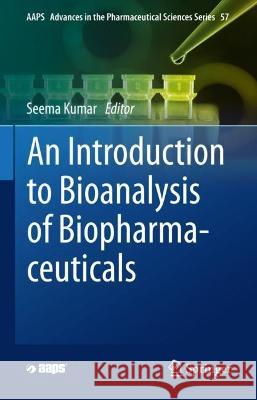An Introduction to Bioanalysis of Biopharmaceuticals » książka
topmenu
An Introduction to Bioanalysis of Biopharmaceuticals
ISBN-13: 9783030971922 / Angielski / Twarda / 2022
An Introduction to Bioanalysis of Biopharmaceuticals
ISBN-13: 9783030971922 / Angielski / Twarda / 2022
cena 685,93 zł
(netto: 653,27 VAT: 5%)
Najniższa cena z 30 dni: 655,41 zł
(netto: 653,27 VAT: 5%)
Najniższa cena z 30 dni: 655,41 zł
Termin realizacji zamówienia:
ok. 22 dni roboczych
Bez gwarancji dostawy przed świętami
ok. 22 dni roboczych
Bez gwarancji dostawy przed świętami
Darmowa dostawa!
The book provides a comprehensive review of the fundamental and practical aspects of bioanalytical support and the integral role it plays in the development of safe and efficacious biopharmaceutical drugs with speed and cost-effectiveness. The book focuses on a broad range of conventional and emerging biopharmaceutical modalities including monoclonal antibody-based therapeutics, gene therapy, cell therapy, peptides and oligonucleotides.
The book starts with an introductory overview of bioanalysis showcasing the integral role it plays in understanding the drug disposition (pharmacokinetics/pharmacodynamics and immunogenicity) and the progression of bioanalytical strategy as the drug progresses through discovery and development stages of the program, taking into consideration the continually evolving regulatory landscape.
The book further diversifies into individual biopharmaceutical modalities - monoclonal antibodies, antibody-drug conjugates, bispecifics, Fc-fusion proteins, gene therapies, cell therapies, peptides and oligonucleotides. The individual chapters focus on modality-specific bioanalytical assay strategies, critical reagents, assay formats, analytical platforms, associated bioanalytical challenges and mitigation strategies, industry best practices, and the latest understanding of regulatory guidance as applicable to the fast-growing biopharmaceutical landscape.











